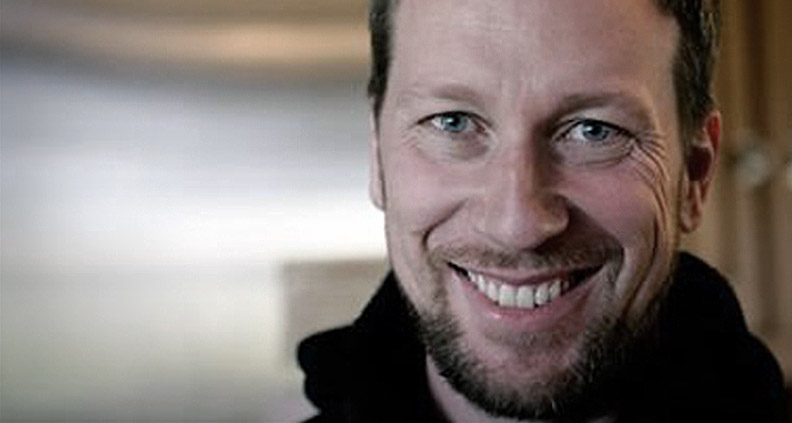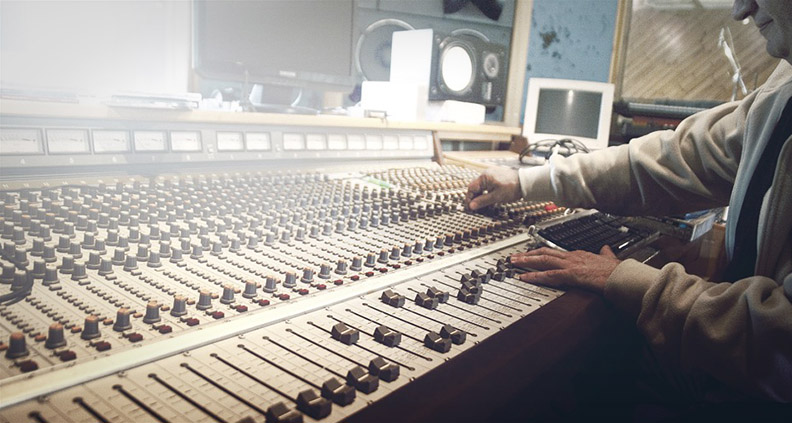From the Archives: ‘Ask a Pro’ with Film Composer Rolfe Kent
Composer Rolfe Kent needs no introduction to indie film fans. As a longtime collaborator with Alexander Payne and Jason Reitman, his idiosyncratic music has complemented some of the decade’s most prominent and popular independent films, including Election, About Schmidt, Thank You For Smoking, Up In The Air and Sideways. Other highlights include the scores for Mean Girls, The House of Yes, Slums of Beverly Hills, Legally Blonde, Wedding Crashers and Charlie St. Cloud. Film Independent caught up with him at his studio in Los Angeles.

When working with a filmmaker for the first time, do you typically prefer to see a rough cut before signing onto the project?
Absolutely. Very often, whatever you started out with in the script has not quite made it onto the screen for various reasons, and the music can help you get back to what you had hoped for in the first place. There may not be the right chemistry, or the excitement, or the tension that the screenplay seems to have or seemed to promise. But the music can contribute those qualities. The music is very much there to interact with images, not simply to go along with the script. So you really do need the images and a good idea as to how they’re flowing and the kind of story you’re telling before you get too concerned about music.
When you’re working with a director for the first time do you have a set of guidelines you give him or her?
Absolutely. The guidelines have nothing to do with musical terminology; they’re more about how to think about the music and what it does in the film. There are four basic questions, which are always good questions to come back to whenever you’re in any doubt as to how to talk about music for a certain moment in the film. For every single moment of the film, one should be able to address that moment with these four questions:
1) What’s missing if we don’t put music here?
2) What do you want the audience to feel?
3) What is the energy supposed to be?
4) What is the point of view?
What’s missing if we don’t put music here? If nothing is missing, then there’s nothing to write. There’s no point in contributing music to a scene that already works. It’s crucial to be able to have that discussion and know that the music has a very specific job and know what that job is. Directors have often watched the film 3,000 times and they’ve lost confidence in the material because they no longer see it as the drama it actually is. They’re just seeing edits and performance pieces, but they’re kind of losing perspective. Sometimes you get asked, “We need your thoughts on music for this scene,” and you look at it and go, “I don’t know why. The scene’s fantastic—why do you need music here?” And the director will say, “Oh, you actually think it works?” And in those cases, there really is nothing to do.
What do you want the audience to feel? What is the energy supposed to be? That same scene, when you ask what the energy is supposed to be, sometimes you can get everything right, except that the director wanted it fast, and you didn’t know because you didn’t ask. The question to ask is, “What is it you’re really hoping for, in terms of momentum and pulse, in this sequence?”
What is the point of view? Point of view is crucial. Music can support character A or character B or it can change point of view in the middle of a scene. So the point of view is absolutely crucial. It might be the director’s point of view, it might be the audience’s point of view, or it might be a character’s point of view. That’s a key way of framing what the music’s [meant] to do.
You don’t see the word “music” in those questions apart from the first one. The reason being, we’re talking about drama. We’re talking about storytelling. We’re not talking about music. Music is what the composer is going to bring to support storytelling and drama. But music is a good thing to talk about when a director has very specific likes or dislikes. If the director cannot abide the sound of the oboe, then please let the composer know because otherwise all of this oboe may appear and the director might hate it. On Sideways, [Alexander Payne] was very clear very early on that he wanted a jazz score and quite a specific kind of jazz score. So we talked about the music beforehand and played records so that we actually knew what we were talking about.
That was my next question.
I don’t want to hear temp score, but I do want to know if there’s a strong direction that people have in mind. There was another film I did which asked to be very “Rhapsody in Blue-esque.” I mean, lots of Gershwin colors. And so you have to have that discussion and you have to know what you’re talking about. But mostly I don’t get asked that. It happens sometimes, but often [filmmakers] leave me to my own devices. But there may be no need to actually talk about music unless someone’s got a very specific interest. It’s very easy to think that a DP or a composer only lives within his or her own province. But a lot of us come to [scoring] because we love to make films and perhaps have done other jobs within the industry. So it’s not that you shouldn’t know how to talk to us. We’re really filmmakers at heart. We just have our own little area of specialization.
What are the pros and cons of having a temp score?
The pros are: you know when you’re editing a film to leave room for music and you don’t start cutting things too tightly because you think they’re boring. A lot of people don’t really understand what they’re looking at unless it feels a bit more finished. And now that editing is digital, you don’t see what you used to. In the old days you used to see greased pencil marks all over the film to indicate dissolves. Now you see all those dissolve and changes, and it just feels appropriate that music should already be there even though [as a composer] you haven’t gotten there yet. So [having a temp score] helps a lot of people understand what they’re looking at.
The con is: you don’t own that music, you will never own that music and you can’t afford that music. And anyway, it was only ever a placeholder. It was there to occupy some space and was never designed for your film. So people get rather attached to these placeholders. You just get used to it. You get used to the way it works with the picture. And so when you finally get the original music, sometimes it takes people a little while to get used to it.
Right, they often pick it because it’s a favorite piece and they just get married to it. And in their minds, no other music will ever match it.
Exactly. And that’s fine if your name is Stanley Kubrick and you’re making 2001: A Space Odyssey and you never really intended to have an original score, then fine [laughs]. You’ve found the music you really wanted. We call it “temp love” when a director can’t quite move on from what they were used to. And it’s awkward because here’s the composer who’s done some great original work specifically for this project. And it’s very frustrating when, as a composer, you’re aware that the director hasn’t been sold on your work, but you’re also aware that you did exactly what was needed. So you’re just waiting, frustrated, for the director to get it, to finally get that the music is contributing something different, but better.
That’s another actually really strong bit of advice. I once worked with a director who was very quick to judge and dismiss music. At some point I suggested that he couldn’t dismiss a piece of music for three days. The reason being, I could tell he was simply waiting for the music to do exactly what he had in his head. Which is impossible, because I don’t know what’s going on inside his head. So when I told him that he had to wait three days, first, he completely agreed and, second, it changed the nature of the relationship completely, because it suddenly meant that the director was able to do what directors often do: appraise the music not for what it isn’t, but for what it is and for what it contributes. And quite often it contributes something different to what was expected. But different isn’t always bad.

Does the music editor go to the sound mix?
They do. My music editor stays for the duration of the mix. On lower budget films, quite often composers don’t have music editors. Music editors are a godsend; they make sure to deliver something at the final mix that’s flexible enough that the director will have some control. That’s not really a concern for composers. Composers just want to do a great piece of music. But the music editor wants there to be flexibility. If there’s dialogue and the music editor is aware that the director is concerned that the music is going to be too loud, then the music editor is going to make sure that the brass and the percussion are all on their separate stems so that when it comes to the mix you can soften the volumes of the loud elements and let the dialog come through.
For more information about upcoming Film Independent events, click here. To learn more about our Film Education programs, click here.
Learn how to become a Member of Film Independent by visiting our website, and click here to subscribe to our YouTube channel.
(EDITOR’S NOTE: The following blog originally ran on filmindependent.org several years ago. We’re republishing it here, with minor edits to the original text. Special thanks to author Paul Cowling, Associate Director of Education at Film Independent.)